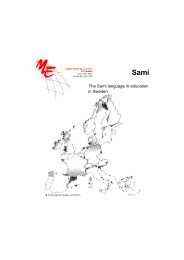Multilingual Early Language Transmission (MELT) - Mercator ...
Multilingual Early Language Transmission (MELT) - Mercator ...
Multilingual Early Language Transmission (MELT) - Mercator ...
Create successful ePaper yourself
Turn your PDF publications into a flip-book with our unique Google optimized e-Paper software.
5. Recommendations for materials and resources in pre-school<br />
During the last decade, a number of research projects has been carried out. At the same<br />
time, and particularly in Europe, a variety of projects has been initiated on bilingual or<br />
immersion pre-school services. Both the research and the action projects are established to<br />
meet one of the four strategic objectives of the EU program Education and Training 2020 98 :<br />
improving the quality and efficiency of education and training.<br />
General conclusion from these studies is that only qualified caretakers and teachers should<br />
be working with (young) children, and that languages are an essential part of the pre-school<br />
curriculum. It is important that students acquire language awareness and the ability to deal<br />
with different languages at their future workplace. Across Europe, nurseries, day-care<br />
centres, playgroups, pre‐schools and kindergartens are setting the stage for children to learn<br />
two or more languages. In this chapter some studies, projects and development of<br />
methodologies and materials for pre-school are described. Further, the results of<br />
implementing the <strong>MELT</strong> Guide are presented in paragraph 5.2 and some recommendations<br />
for minority pre-school teachers are presented in the sections about exchanging good<br />
practices in paragraph 5.4.<br />
5.1 Methodologies for pre-school teaching<br />
Sometimes pre-school practitioners have received little specific training and support for<br />
language teaching. Nevertheless, and especially where as soon as the target and instruction<br />
language is a minority language in pre-school, these practitioners are expected to act as<br />
language specialists. Because most materials and methods for pre-school teachers are<br />
intended for majority languages and mostly the materials are intended for children from the<br />
age of 3 or older. The four partners of the <strong>MELT</strong> project developed a Guide for all pre-school<br />
practitioners working together in a pre-school as well as for practitioners who just start<br />
working in minority or bilingual pre-school settings and who want to improve their<br />
knowledge and skills. This Guide contains language development activities which are<br />
intended for all pre-school settings; pre-school practitioners in nurseries, playgroups, day<br />
care centers and other pre-school professionals dealing with bilingualism and young children<br />
from 0 - 4 years. This Guide provides ideas to create a supportive and rich language<br />
environment in pre-school provisions for children. This Guide aims to make language work as<br />
an integral part of pre-school activities, and that language activities will be of value in the<br />
day to day activities of the pre-school.<br />
The implementing process of the <strong>MELT</strong> Guide will be described in section 5.2. In the next<br />
section other developed pedagogical approaches and methodologies are presented.<br />
98 “Education and Training 2020” (ET 2020), Council conclusions of 12 May 2009 on a strategic framework for European cooperation in<br />
education and training. It provides common strategic objectives for Member States, including a set of principles for achieving these<br />
objectives, as well as common working methods with priority areas for each periodic work cycle.<br />
68



